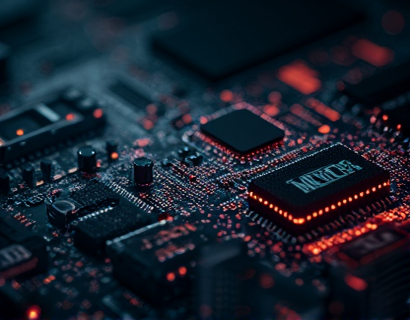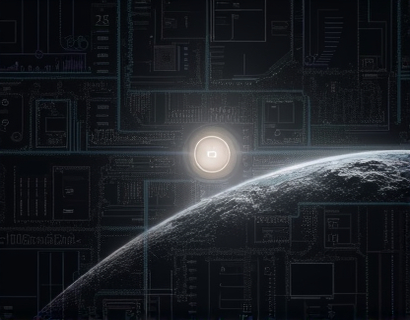Decentralized Innovation: Empowering Global Blockchain Ecosystems Through Comprehensive Collaboration Platforms
In the rapidly evolving landscape of blockchain technology, the concept of decentralization has emerged as a cornerstone for innovation and transformation. Decentralized networks offer a paradigm shift from traditional centralized systems, promising enhanced security, transparency, and resilience. However, the true potential of decentralized networks can only be realized through comprehensive collaboration platforms that foster innovation, enhance governance, and drive global efficiency and scalability. This article delves into the significance of such platforms and how they are reshaping the blockchain ecosystem for enthusiasts and innovators worldwide.
The Need for Collaboration in Decentralized Networks
Decentralized networks thrive on the principle of collective participation and shared governance. Each node in the network contributes to the overall functionality and security of the system. However, the complexity and diversity of blockchain projects often lead to fragmented efforts and siloed development. This fragmentation can hinder the growth and adoption of blockchain technology. A comprehensive collaboration platform addresses this challenge by providing a unified space where developers, researchers, and stakeholders can converge, share knowledge, and collaborate on projects. Such platforms are essential for breaking down barriers and fostering a cohesive blockchain community.
Enhancing Innovation Through Collaboration
Innovation is the lifeblood of the blockchain ecosystem. New ideas and technologies emerge constantly, but their development and implementation often require collaboration across various disciplines and domains. A dedicated collaboration platform can significantly accelerate the innovation process by facilitating the exchange of ideas, resources, and expertise. For instance, developers can contribute to open-source projects, researchers can share findings and insights, and industry experts can provide guidance and mentorship. This synergy not only speeds up the development of new solutions but also ensures that they are robust, secure, and aligned with the needs of the community.
Case Studies of Successful Collaborative Projects
Several projects have demonstrated the power of collaborative platforms in driving innovation. One notable example is the Ethereum Improvement Proposals (EIP) process, which involves a community-driven approach to proposing and implementing enhancements to the Ethereum protocol. This process relies on extensive discussions, peer reviews, and consensus-building among developers and stakeholders. Another example is the Polygon project, which brings together a diverse group of developers and organizations to create scalable and interoperable blockchain solutions. These projects highlight how collaboration can lead to significant advancements and widespread adoption of blockchain technology.
Fostering Governance Through Decentralized Decision-Making
Effective governance is crucial for the sustainability and success of decentralized networks. Traditional governance models often suffer from centralization, leading to bottlenecks and a lack of accountability. A comprehensive collaboration platform can introduce decentralized governance mechanisms that empower the community to participate in decision-making processes. This approach ensures that all voices are heard and that decisions are made in the best interest of the ecosystem. By leveraging blockchain technology, such platforms can implement transparent and tamper-proof voting systems, smart contracts for automated execution of governance rules, and real-time feedback mechanisms.
Decentralized Autonomous Organizations (DAOs)
Decentralized Autonomous Organizations (DAOs) are a prime example of decentralized governance in action. A DAO is a community-governed entity that operates through smart contracts on a blockchain. Members of the DAO contribute tokens or other assets to participate in decision-making, with voting rights proportional to their contributions. This model not only democratizes governance but also aligns the interests of all participants, as they have a direct stake in the success of the organization. Platforms that support the creation and management of DAOs can significantly enhance the governance capabilities of decentralized networks, making them more resilient and adaptive to changing conditions.
Driving Global Efficiency and Scalability
One of the key challenges facing blockchain technology is scalability. As the number of users and transactions grows, traditional blockchain networks often struggle to maintain performance and efficiency. Comprehensive collaboration platforms can address this issue by promoting the development of scalable solutions and best practices. For example, platforms can facilitate the sharing of research on layer 2 solutions, cross-chain interoperability, and efficient consensus mechanisms. By pooling knowledge and resources, the community can accelerate the adoption of scalable technologies, ensuring that decentralized networks can handle increasing loads without compromising on security or decentralization.
Interoperability and Cross-Chain Collaboration
Interoperability is another critical aspect of scalability. Blockchain networks that can seamlessly interact and exchange value with each other create a more cohesive and efficient ecosystem. Collaboration platforms can play a pivotal role in fostering cross-chain collaboration by providing tools and protocols that enable interoperability. This includes the development of standardized interfaces, bridge solutions, and consensus mechanisms that allow different blockchain networks to work together harmoniously. Such efforts not only enhance the utility of individual networks but also create a more robust and interconnected global blockchain infrastructure.
Building a Thriving Ecosystem
A thriving blockchain ecosystem requires more than just technological innovation; it demands a supportive and inclusive environment where all participants can grow and succeed. Comprehensive collaboration platforms can contribute to this by offering a range of resources and services. These may include educational materials, community forums, mentorship programs, and funding opportunities. By nurturing talent and providing support to new entrants, these platforms help build a diverse and vibrant community that drives continuous innovation and growth.
Education and Community Building
Education is a fundamental component of any thriving ecosystem. Collaboration platforms can host webinars, workshops, and online courses to educate users about blockchain technology, best practices, and emerging trends. Community forums and discussion boards provide a space for users to ask questions, share experiences, and collaborate on projects. By fostering a culture of learning and collaboration, these platforms ensure that the community remains informed, engaged, and motivated to contribute to the ecosystem.
Funding and Resource Allocation
Access to funding and resources is crucial for the development and scaling of blockchain projects. Collaboration platforms can facilitate access to capital through crowdfunding, token sales, and investment opportunities. They can also connect projects with potential partners, investors, and mentors, ensuring that promising initiatives receive the support they need. By streamlining the process of resource allocation, these platforms help level the playing field and empower a wider range of projects to succeed.
Challenges and Considerations
While the benefits of comprehensive collaboration platforms are clear, there are several challenges and considerations that must be addressed to ensure their success. Security is paramount, as collaboration platforms handle sensitive information and critical infrastructure. Robust security measures, regular audits, and transparent reporting are essential to build trust and confidence among users. Additionally, governance mechanisms must be designed to prevent centralization and ensure that power is distributed equitably among participants. Balancing decentralization with efficiency and usability is a delicate task that requires careful planning and ongoing adaptation.
Scalability and Usability
As the adoption of blockchain technology grows, collaboration platforms must scale to accommodate increasing demand without compromising performance. This requires scalable infrastructure, efficient algorithms, and optimized user interfaces. Usability is equally important, as platforms need to be accessible and user-friendly to attract and retain a diverse user base. By focusing on scalability and usability, platforms can ensure that they remain relevant and valuable to the community over the long term.
Conclusion
Comprehensive collaboration platforms are instrumental in empowering global blockchain ecosystems through enhanced innovation, governance, and efficiency. By providing a unified space for collaboration, these platforms break down barriers, foster synergy, and drive the collective advancement of the blockchain community. As the technology continues to evolve, the role of such platforms will become increasingly vital in shaping a decentralized future that is secure, scalable, and inclusive. For blockchain enthusiasts and innovators, embracing these platforms is not just an advantage but a necessity for staying at the forefront of this transformative movement.











































